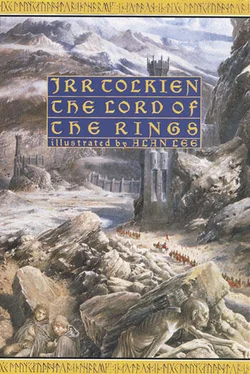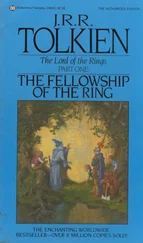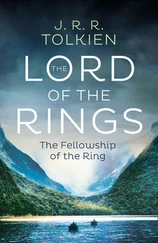The Lord of the Rings has been read by many people since it finally appeared in print; and I should like to say something here with reference to the many opinions or guesses that I have received or have read concerning the motives and meaning of the tale. The prime motive was the desire of a tale-teller to try his hand at a really long story that would hold the attention of readers, amuse them, delight them, and at times maybe excite them or deeply move them. As a guide I had only my own feelings for what is appealing or moving, and for many the guide was inevitably often at fault. Some who have read the book, or at any rate have reviewed it, have found it boring, absurd, or contemptible; and I have no cause to complain, since I have similar opinions of their works, or of the kinds of writing that they evidently prefer. But even from the points of view of many who have enjoyed my story there is much that fails to please. It is perhaps not possible in a long tale to please everybody at all points, nor to displease everybody at the same points; for I find from the letters that I have received that the passages or chapters that are to some a blemish are all by others specially approved. The most critical reader of all, myself, now finds many defects, minor and major, but being fortunately under no obligation either to review the book or to write it again, he will pass over these in silence, except one that has been noted by others: the book is too short.
As for any inner meaning or ‘message’, it has in the intention of the author none. It is neither allegorical nor topical. As the story grew it put down roots (into the past) and threw out unexpected branches: but its main theme was settled from the outset by the inevitable choice of the Ring as the link between it and The Hobbit. The crucial chapter, ‘The Shadow of the Past’, is one of the oldest parts of the tale. It was written long before the foreshadow of 1939 had yet become a threat of inevitable disaster, and from that point the story would have developed along essentially the same lines, if that disaster had been averted. Its sources are things long before in mind, or in some cases already written, and little or nothing in it was modified by the war that began in 1939 or its sequels.
The real war does not resemble the legendary war in its process or its conclusion. If it had inspired or directed the development of the legend, then certainly the Ring would have been seized and used against Sauron; he would not have been annihilated but enslaved, and Barad-dûen destroyed but occupied. Saruman, failing to get possession of the Ring, would in the confusion and treacheries of the time have found in Mordor the missing links in his own researches into Ring-lore, and before long he would have made a Great Ring of his own with which to challenge the self-styled Ruler of Middle-earth. In that conflict both sides would have held hobbits in hatred and contempt: they would not long have survived even as slaves.
Other arrangements could be devised according to the tastes or views of those who like allegory or topical reference. But I cordially dislike allegory in all its manifestations, and always have done so since I grew old and wary enough to detect its presence. I much prefer history, true or feigned, with its varied applicability to the thought and experience of readers. I think that many confuse ‘applicability’ with ‘allegory’; but the one resides in the freedom of the reader, and the other in the purposed domination of the author.
An author cannot of course remain wholly unaffected by his experience, but the ways in which a story-germ uses the soil of experience are extremely complex, and attempts to define the process are at best guesses from evidence that is inadequate and ambiguous. It is also false, though naturally attractive, when the lives of an author and critic have overlapped, to suppose that the movements of thought or the events of times common to both were necessarily the most powerful influences. One has indeed personally to come under the shadow of war to feel fully its oppression; but as the years go by it seems now often forgotten that to be caught in youth by 1914 was no less hideous an experience than to be involved in 1939 and the following years. By 1918 all but one of my close friends were dead. Or to take a less grievous matter: it has been supposed by some that ‘The Scouring of the Shire’ reflects the situation in England at the time when I was finishing my tale. It does not. It is an essential part of the plot, foreseen from the outset, though in the event modified by the character of Saruman as developed in the story without, need I say, any allegorical significance or contemporary political reference whatsoever. It has indeed some basis in experience, though slender (for the economic situation was entirely different), and much further back. The country in which I lived in childhood was being shabbily destroyed before I was ten, in days when motor-cars were rare objects (I had never seen one) and men were still building suburban railways. Recently I saw in a paper a picture of the last decrepitude of the once thriving corn-mill beside its pool that long ago seemed to me so important. I never liked the looks of the Young miller, but his father, the Old miller, had a black beard, and he was not named Sandyman. The Lord of the Rings is now issued in a new edition, and the opportunity has been taken of revising it. A number of errors and inconsistencies that still remained in the text have been corrected, and an attempt has been made to provide information on a few points which attentive readers have raised. I have considered all their comments and enquiries, and if some seem to have been passed over that may be because I have failed to keep my notes in order; but many enquiries could only be answered by additional appendices, or indeed by the production of an accessory volume containing much of the material that I did not include in the original edition, in particular more detailed linguistic information. In the meantime this edition offers this Foreword, an addition to the Prologue, some notes, and an index of the names of persons and places. This index is in intention complete in items but not in references, since for the present purpose it has been necessary to reduce its bulk. A complete index, making full use of the material prepared for me by Mrs. N. Smith, belongs rather to the accessory volume.
1 Concerning Hobbits
This book is largely concerned with Hobbits, and from its pages a reader may discover much of their character and a little of their history. Further information will also be found in the selection from the Red Book of Westmarch that has already been published, under the title of The Hobbit. That story was derived from the earlier chapters of the Red Book, composed by Bilbo himself, the first Hobbit to become famous in the world at large, and called by him There and Back Again, since they told of his journey into the East and his return: an adventure which later involved all the Hobbits in the great events of that Age that are here related.
Many, however, may wish to know more about this remarkable people from the outset, while some may not possess the earlier book. For such readers a few notes on the more important points are here collected from Hobbit-lore, and the first adventure is briefly recalled.
Hobbits are an unobtrusive but very ancient people, more numerous formerly than they are today; for they love peace and quiet and good tilled earth: a well-ordered and well-farmed countryside was their favourite haunt. They do not and did not understand or like machines more complicated than a forge-bellows, a water-mill, or a hand-loom, though they were skilful with tools. Even in ancient days they were, as a rule, shy of ‘the Big Folk’, as they call us, and now they avoid us with dismay and are becoming hard to find. They are quick of hearing and sharp-eyed, and though they are inclined to be fat and do not hurry unnecessarily, they are nonetheless nimble and deft in their movements. They possessed from the first the art of disappearing swiftly and silently, when large folk whom they do not wish to meet come blundering by; and this art they have developed until to Men it may seem magical. But Hobbits have never, in fact, studied magic of any kind, and their elusiveness is due solely to a professional skill that heredity and practice, and a close friendship with the earth, have rendered inimitable by bigger and clumsier races.
Читать дальше
Конец ознакомительного отрывка
Купить книгу












